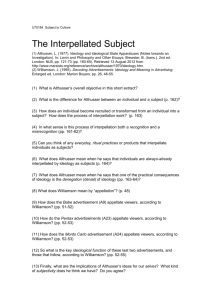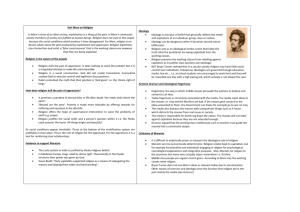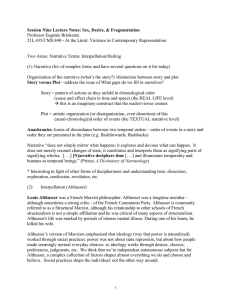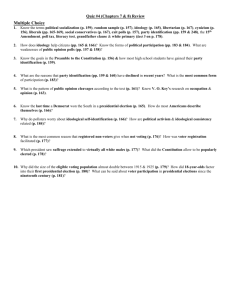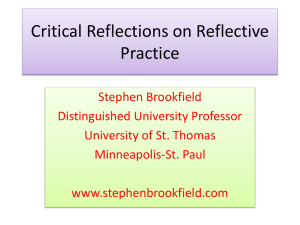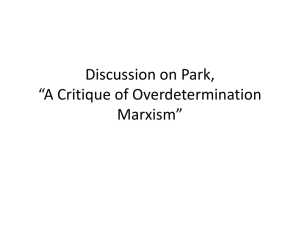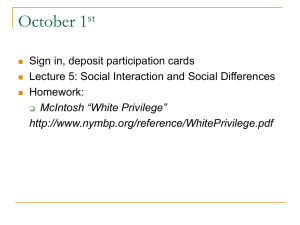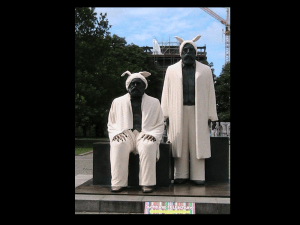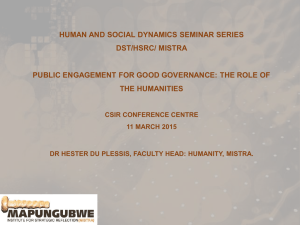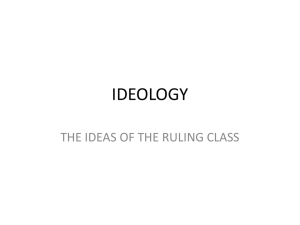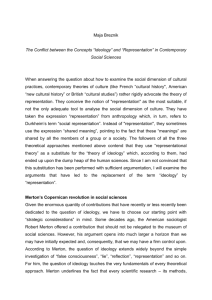02.18.03
advertisement
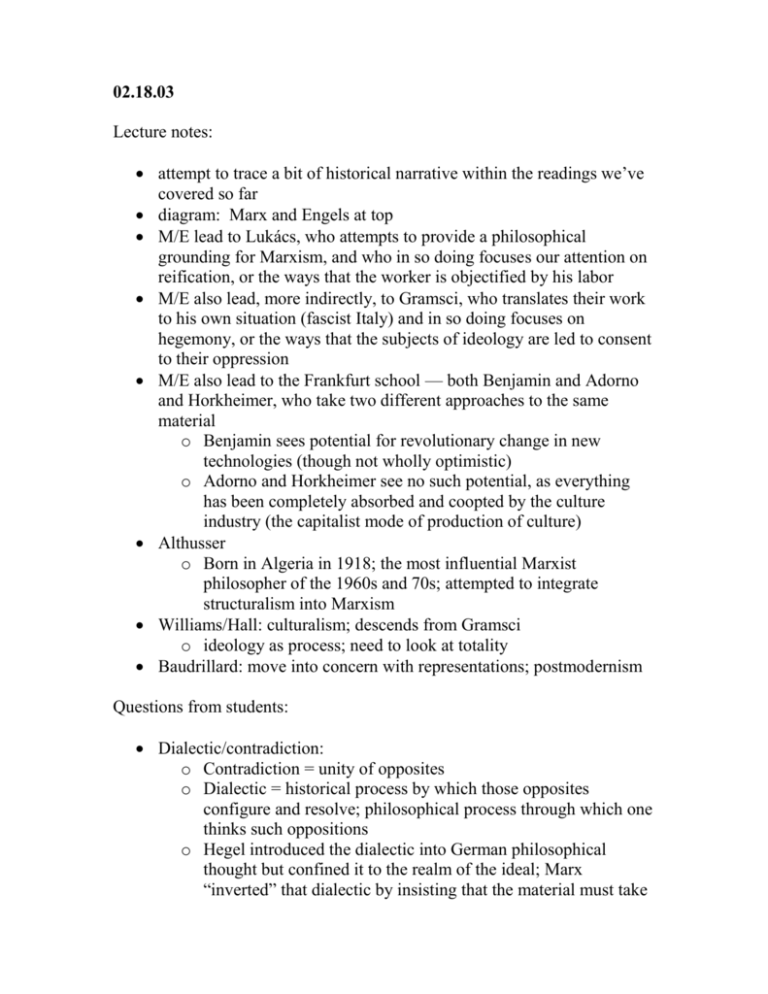
02.18.03 Lecture notes: attempt to trace a bit of historical narrative within the readings we’ve covered so far diagram: Marx and Engels at top M/E lead to Lukács, who attempts to provide a philosophical grounding for Marxism, and who in so doing focuses our attention on reification, or the ways that the worker is objectified by his labor M/E also lead, more indirectly, to Gramsci, who translates their work to his own situation (fascist Italy) and in so doing focuses on hegemony, or the ways that the subjects of ideology are led to consent to their oppression M/E also lead to the Frankfurt school — both Benjamin and Adorno and Horkheimer, who take two different approaches to the same material o Benjamin sees potential for revolutionary change in new technologies (though not wholly optimistic) o Adorno and Horkheimer see no such potential, as everything has been completely absorbed and coopted by the culture industry (the capitalist mode of production of culture) Althusser o Born in Algeria in 1918; the most influential Marxist philosopher of the 1960s and 70s; attempted to integrate structuralism into Marxism Williams/Hall: culturalism; descends from Gramsci o ideology as process; need to look at totality Baudrillard: move into concern with representations; postmodernism Questions from students: Dialectic/contradiction: o Contradiction = unity of opposites o Dialectic = historical process by which those opposites configure and resolve; philosophical process through which one thinks such oppositions o Hegel introduced the dialectic into German philosophical thought but confined it to the realm of the ideal; Marx “inverted” that dialectic by insisting that the material must take precedence over the ideal, that in fact the material produces the ideal o Hegel introduced the dialectic as a means of combating the overwhelming force of formal logic in German philosophy; formal logic holds that if a is true, then not-a cannot be true; the dialectic is a means of acknowledging that both a and not-a can be true at once, that everything contains its own contradiction o Marx and Engels introduce materialism into this equation — thus the theoretical foundation of Marxist practice will often be referred to as “dialectical materialism” — thus, the kinds of things that Marxists generally refer to when they talk about “contradiction” in capitalist society include the institution of private property (which leads to a situation in which some are free to own property, and others are not), free labor (in which some are free to sell their labor on the open market, and others are not), and so forth, all of which point to the contradictory nature of capitalism itself, which operates on the belief that all are free to get rich while necessitating a vast underclass in order to survive. o Thus contradiction is precisely the thing, for Marx, that will lead to revolution, because the simultaneous existence of these opposites demands a resolution. Gramsci: state v. civil society: o For Gramsci, the ruling apparatus of any given society can be broken down into the state (which is the official government and all of its structures) and civil society (which is all of the other structuring institutions of the society, such as the educational system, religious institutions, etcetera) o The importance of this distinction contributes to the distinction that he draws between the “war of maneuver,” in which the revolutionary forces attack the state directly, and the “war of position,” which is carried out largely within civil society. The war of maneuver is thus largely physical and military, while the war of position is largely ideological. o Moreover, this distinction contributes to Gramsci’s shift from the Marxian idea of dominance to his idea of “hegemony,” in that hegemony is not simply control of the government but in fact a negotiated control of civil society. Hegemony is thus first and foremost ideological, the hegemony of ideas. o You can thus see a reflection of Gramsci’s ideas about the state and civil society in Althusser’s ideas about the distinction between the Repressive State Apparatus and the Ideological State Apparatus. One difference between Gramsci’s ideas, though, and Althusser’s should be obvious through the ways they name their terms — Althusser considers both the repressive and the ideological to form part of the state. We can talk about this more today in conjunction with Althusser. o There is also a similar division in Althusser between the base and the superstructure that needs to be explored: the base for Althusser is, in its simplest form, the mode of production — capitalism, for instance — and the superstructure is the rest of the society (both the RSA and the ISAs), the structure of which is determined by the base (like the way the foundation of a building determines what can be built upon it). There’s a bit of a paradox contained in the ISAs essay, though, which I hope we’ll talk about in a bit, in that Althusser begins from the notion that the mode of production needs constantly to be reproduced by a culture, and thus, in a paradoxical fashion, the superstructure supports the base. Overdetermination o This term arises from Freudian psychoanalysis; Freud suggests in The Interpretation of Dreams that the latent content, or the meaning, of a dream is “overdetermined” by its manifest content — which you should understand to mean that the significance of the dream is produced not simply by one image or symbol or occurrence within it, but by multiple images or symbols or occurrences — and thus multiple paths of interpretation will lead you to the same conclusion. The meaning is thus “overdetermined” because it is determined simultaneously by many variables, and is thus inescapable. o Althusser adopts this notion of overdetermination to Marxist thought by putting forward the argument that ideology is not determined by a simple correspondence to the “general contradiction” — that of class — but is rather overdetermined by a multiplicity of contradictions — not simply class, but also race, gender, language, religion, etc. Thus, ideology is not determined by a simple functioning of the mode of production, but rather a complex functioning of all of society. o A key group of ideas in Althusser grow out of this concept of overdetermination: one is the “relative autonomy” of the superstructures from the base, which suggests that the relationship between the mode of production and civil society is no longer seen as being directly determinant or causative; another is the notion that the mode of production is determinant “in the last instance” of the structure of society — and thus that economy is important in, but not the sole origin of ideology Ideology: o At this point, I need to talk a bit about ideology. Marx’s writing, and that of the majority of his followers, largely equates “ideology” with “false consciousness” — ideology is, in other words, the lies that are told to the oppressed classes in order to keep them in check. Thus the need, in Marx (and in Lukacs), to awaken the proletariat from false consciousness into class consciousness. o Althusser is the first of the writers we’ve read to fully dissociate ideology from this earlier sense. Ideology is, for Althusser, a whole complex of multiple systems of representation which describe the imaginary relations of men and women to their real, lived conditions of existence. o There is, however, a real divide between the early work of Althusser (that which we’ve read in “Overdetermination and Contradiction,” for instance) and his later work, which we encounter in “Ideology and Ideological State Apparatuses.” This is where I’m going to leave off. I’ll leave time at the end of class for any further questions that this may have raised for you. But for now, what I want to do is to ask you to get into your small groups and address the following questions: o What is the overall argument of “Overdetermination and Contradiction”? Of “Ideology and Ideological State Apparatuses”? o What specific differences do you see between “Overdetermination and Contradiction” and “Ideology and Ideological State Apparatuses”? Are there substantive differences between the arguments? Are there differences in the way terms seem to be used? Are there differences in overall tone? o Can you take a guess about how you might begin to account for these differences? Do the dates of the essays suggest to you what might have changed Althusser’s view? Notes: Argument of “Contradiction and Overdetermination”? Other elements than the economic affect the contradictions in a society (examples of Russian and German societies, which are different) The economic contradication is insufficient to induce a revolution; must be an accumulation of circumstances – and some of those circumstances may themselves be contradictory Argues that Marx fails to fully separate the dialectic from Hegel, and thus doesn’t fully invert it Argument of “Ideology and Ideological State Apparatuses”? For capitalism to maintain itself, the means of production must be reproduced; reproduction occurs via state apparatus; divided into RSA and ISAs; maintain a labor force that is willing to function within the current system Differences between essays? In ISA, says this is an expansion of Marx’s theory, beyond the descriptive; C&O seems more a departure from that theory, expanding sense of what contributes to revolution Tone of ISA seems to negate C&O; ISA essay seems much more economically determined – reproduction of system continues pattern rather than allowing for complex influences of C&O ISA seems much more in keeping with Horkheimer and Adorno – ideology is top-down, and not negotiated as in C&O For next time: Another group reading project: a: Williams, “Base and Superstructure…” b: Williams, from Marxism and Literature c: Hall, “Cultural Studies: Two Paradigms” d: Hall, “Signification, Representation, Ideology…” Each group member should read his or her assigned essay carefully. Skim the others. Everyone should also bring to class a one-to-two page single-spaced piece of writing on the theoretical concept of your choice. This may be the same concept you selected earlier, when I asked you to make notes for yourself, or you may have changed your mind. In this piece of writing, you should both define the concept and discuss how different writers we’ve read (not including Berger and Rose) seem to deal with it. You can do this in outline form, if you like, but be as specific as possible — for instance, include quotes, if you can.
